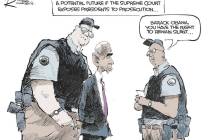Employee Rights Act provides common-sense reforms
From Hillary Clinton's illegal email server to President Barack Obama's dangerous nuclear agreement with Iran, there has been no shortage of serious subjects to keep the Republican presidential field occupied this summer. Beyond these character and national security issues, however, voters also want to hear a positive vision for the economy.
As candidates begin to lay out their economic ideas, they shouldn't lose focus on ground zero — the workplace.
Employment policy typically isn't the first or even the fifth topic in a candidate's stump speech. But it certainly deserves more attention than Republican candidates tend to give it. Americans aged 25 to 54 spend more time at work during the day than doing any other task — including sleeping, according to the Bureau of Labor Statistics. Public policy that impacts the workplace has a direct effect on Americans' lives in a way few other issues can match.
President Obama and his allies in organized labor understand this, and they've spent the past six years trying to paint Republicans as out of touch on policies that affect the office, the shop and the factory floor. We've all heard their talking points: Democrats are for raising the minimum wage. Democrats are for new regulations targeting gender differences in the workplace. Democrats are for boosting unions.
Whatever the merits of these labor policies, they're all designed to be difficult for Republicans to oppose. Hillary Clinton and Bernie Sanders have already used them to great effect in their campaigns this year. But now there is also an opportunity for Republican candidates to seize the moral high ground on workplace issues, through the Employee Rights Act
The ERA is sponsored by Sen. Orrin Hatch, R-Utah, and Congressman Tom Price, R-Georgia. It had more than 100 co-sponsors in the last Congress, including four current presidential candidates. It's the most significant reform to the country's labor laws since the 1940s, and it's designed to protect both union members and the millions of other employees whom unions would like to organize.
The ERA's reforms are so common sense that it might surprise voters that they're not law already. For instance, the ERA would require all union elections to take place via a secret-ballot vote. (Currently, Big Labor can avoid this by using an undemocratic procedure known as "card check.") The law would also require unions to undergo a periodic re-certification vote to ensure that they still have the support of the workplace. (One estimate based on government data finds that less than 10 percent of current union employees voted for the union that collects their dues.)
Some provisions are particularly relevant heading into an election year. For instance, the law would require unions to seek employees' permission before using their dues money to support candidates and causes that might go against the employees' beliefs. When 40 percent of union members vote Republican, but 90 percent of union dollars go to support Democrats and left-wing causes, that's not just a problem — it's a political opportunity and a spur to reform.
Because these provisions and others in the ERA strengthen employees rather than unions or big business, they enjoy widespread public support. According to a series of polls from ORC International, most of the reforms in the ERA command 70-plus percent support in both union and nonunion households, and across both political parties. This helps explain why labor bosses — not to mention Democratic presidential candidates who rely on them for financial support — have offered nothing of substance when pressed to respond to a law that would weaken their monopoly on workplace rights.
That's all the more reason for Republican presidential candidates to put the issue front-and-center in their own campaigns. With 10 more nationally televised debates and an upcoming White House summit on union power, they'll have no shortage of opportunities. It's time for Republicans to stop playing defense on workplace issues. Instead, candidates should offer a pro-employee alternative that inspires voters — and perhaps does the same for a presidential campaign or two in need of inspiration.
— Rick Berman is executive director of the Center for Union Facts, a group working to advance employee rights. Newt Gingrich served as House speaker from 1995 to 1999 and is an adviser to the Center for Union Facts.























